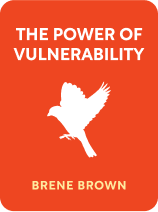

This article is an excerpt from the Shortform book guide to "The Power Of Vulnerability" by Brené Brown. Shortform has the world's best summaries and analyses of books you should be reading.
Like this article? Sign up for a free trial here .
Are you looking for quotes from Brené Brown’s TED Talk, The Power of Vulnerability? Want an analysis of what the quotes mean?
The Power of Vulnerability by Brené Brown was a lecture about overcoming shame, becoming vulnerable, and living wholeheartedly. In her speech, Brown discusses the importance of living authentically in a world that is full of comparison and judgment.
Continue reading for The Power of Vulnerability quotes with explanations.
Quotes From The Power of Vulnerability
Many people don’t want to discuss shame or vulnerability. In fact, today, people are lonelier, more obese, and more addicted than ever before because they opt to distract or numb themselves rather than address their insecurities or shame.
In her lecture series, The Power of Vulnerability, Brené Brown breaks down the various aspects of shame, addresses the importance of vulnerability, and offers 10 practices that you can use to embrace vulnerability and start living a wholehearted life.
Here are some of the best The Power of Vulnerability quotes:
“You can’t numb those hard feelings without numbing the other affects, our emotions. You cannot selectively numb. So when we numb those, we numb joy, we numb gratitude, we numb happiness. And then we are miserable, and we are looking for purpose and meaning, and then we feel vulnerable, so then we have a couple of beers and a banana nut muffin. And it becomes this dangerous cycle.”
Addiction is compulsive and chronic behaviors used to numb emotions associated with shame. While we often think of addiction in terms of alcohol and drug abuse, it can take many forms. It allows us to ignore our shame and keeps us disengaged from the people around us. For example, if you were addicted to social media, you might find yourself scrolling through Instagram instead of hanging out with your friends and family.
These addictive tendencies occur because we regularly cross the line between “comforting” and “numbing” behaviors:
- Comforting behaviors are actions or activities that bring us joy in times of stress or hardship.
- Numbing behaviors are actions or activities that we rely on to ignore our problems. These behaviors are used to ignore hardship, allowing it to silently develop into shame.
Without careful moderation, comforting behaviors can morph into numbing behaviors. For example, a piece of chocolate during a hard day can provide a moment of comfort while you try to turn your day around. However, if having a single piece of chocolate becomes binge-eating a bag of chocolates every night, it’s become a numbing behavior.
“The people who have a strong sense of love and belonging, believe they are worthy of love and belonging.”
Belonging is our intrinsic desire to be a part of something larger than ourselves. Often, we try to change our behavior to fit in based on other people’s expectations. However, this behavior is unfulfilling and creates more barriers to true belonging. It’s the result of fear and ties self-worth to acceptance by others, which can lead to shame.
True belonging requires that you share your authentic self with the world to connect with other people, linking your sense of belonging to self-acceptance. With self-acceptance, belonging comes from an authentic place and doesn’t tie your self-worth to the opinions of others.
“When we lose our tolerance for vulnerability, joy becomes foreboding.”
Foreboding joy is the feeling of apprehension that develops when things are going well. For example, if you have kids, and you go out with your significant other for the night, foreboding joy would be spending the entire date night worrying about your children with the babysitter instead of enjoying your time with your partner.
However, foreboding joy doesn’t work in practice. No amount of preparation can lessen the impact of tragedy or disappointment, meaning that apprehension squanders positive emotions without providing any benefit. Don’t sacrifice your joy in the moment to fear for an unknown eventuality you have no control over.
“The only people who don’t experience shame have no capacity for human empathy or connection. No one wants to talk about it, and the less you talk about it, the more you have it. What underpinned this shame, this “I’m not good enough,” which, we all know that feeling: “I’m not blank enough. I’m not thin enough, rich enough, beautiful enough, smart enough, promoted enough.” The thing that underpinned this was excruciating vulnerability. This idea of, in order for connection to happen, we have to allow ourselves to be seen, really seen.”
What causes this common source of shame? Comparison. In the United States, students only have creative freedom until around the third grade, at which point teachers begin comparing students’ work. When this happens, many students are told that they’re “not good enough,” and should move on to “more realistic” pursuits.
Sometimes this is taken to an extreme. For example, if your teacher ridiculed your painting, you’d likely be hesitant to jump back into creative pursuits. If that apprehension continued through your developmental years, you may become a grown adult who believes they lack the capacity for creativity.

———End of Preview———
Like what you just read? Read the rest of the world's best book summary and analysis of Brené Brown's "The Power Of Vulnerability" at Shortform .
Here's what you'll find in our full The Power Of Vulnerability summary :
- The 10 practices that you can use to embrace vulnerability and start living a wholehearted life
- Why thinking that you're never "enough" is dangerous
- The most common sources of shame and how to overcome them






